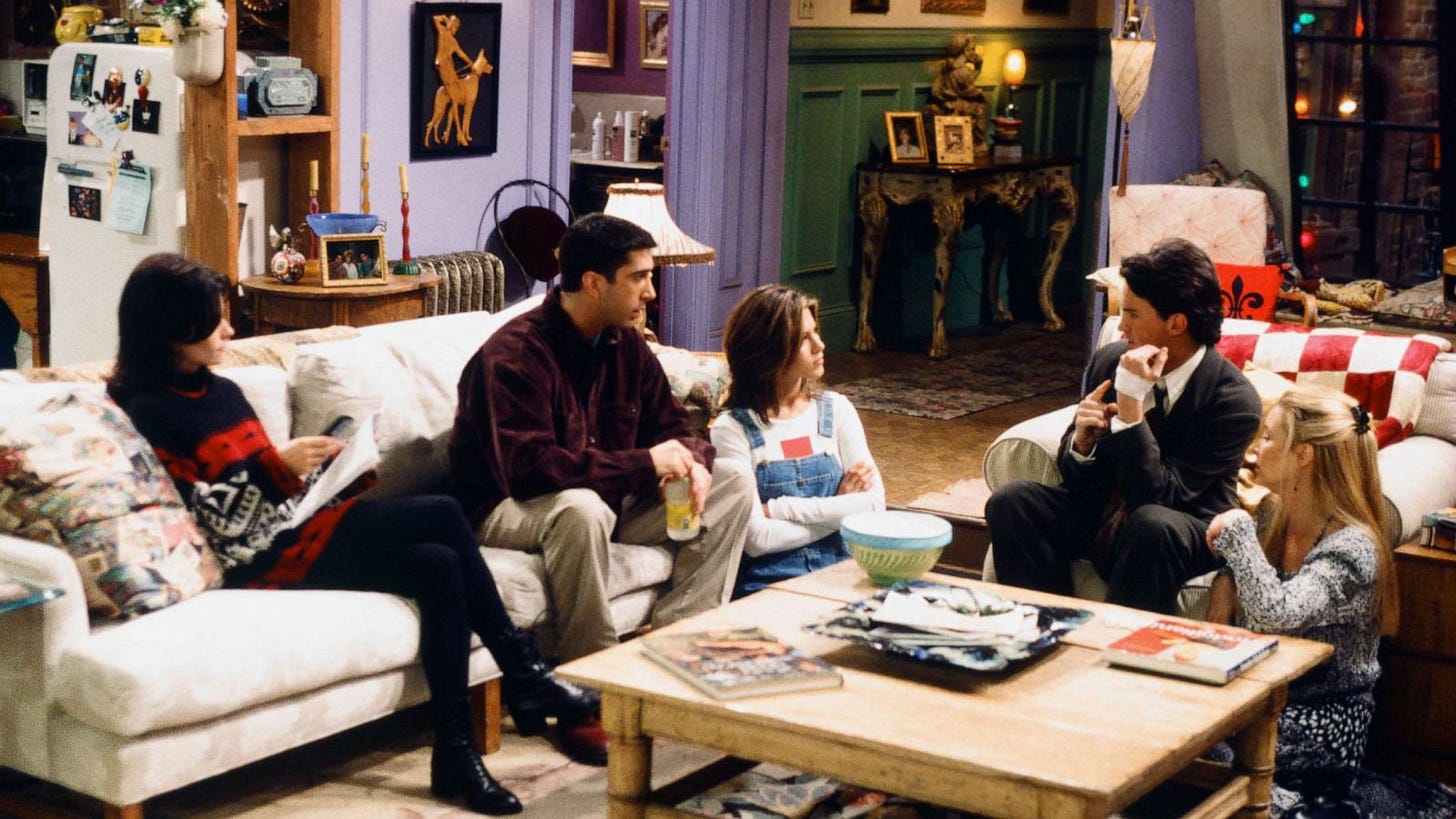"Friends" and Its Consequences Have Been a Disaster for the Human Race
How sitcoms poison your mind and soul.
At the risk of offending some fans of “Friends” and other popular series (don’t get me started on “How I Met Your Mother”), I decided to write this critique of modern sitcoms, after thinking long and hard about the significant negative effect that persistent consumption of this kind of entertainment had on me and on others I know.
I’m using the popular sitcom “Friends” as an example, simply because it’s possibly the all-time most popular series of its kind, and I believe it was precisely its popularity which made it possible for future sitcoms to achieve commercial success and widespread acceptance. The goal of this article is not to compare between sitcoms to try and determine which one is worse (they are all pretty bad), but simply share my opinion on how this kind of entertainment has had long lasting, negative effects on young people.
What You Consume Matters Greatly
Whenever I talk about this with my more “secular” friends, they usually end up accusing me of “making a big deal” out of something harmless. And while I definitely understand why they might perceive it that way, I completely disagree with that position.
It’s not “harmless” for one simple reason: everything we consume and perceive with our senses has a deep impact on shaping who we are, what we believe in, and what we aspire to be. Watching perverted movies will lessen your sensitivity to sin and degeneracy and make it seem normal. Listening to degrading, violent music will have the same effect. And so on with every single input your brain receives.
The same is true for things that are pure and good: listening to godly music, watching good, clean movies, talking to people committed to virtue, these will all start to shape you toward a better version of you.
Finally, brothers and sisters, whatever is true, whatever is noble, whatever is right, whatever is pure, whatever is lovely, whatever is admirable—if anything is excellent or praiseworthy—think about such things.
— Philippians 4:8
What are you feeding your brain with? What occupies your thoughts?
Logically, the answer is “whatever you consume the most”.
So I don’t think watching reruns of “Friends”, “How I Met Your Mother”, or whatever other similar sitcom 24/7 is “harmless”. Far from it. Even less so when you realize how attached young people are to these series. Some, if not most, are so incredibly invested in them, that they end up unconsciously developing what I call the “sitcom personality”.
The “Sitcom Personality”©
Flooding your brain with thousands of hours of sitcom characters interacting with each other slowly shapes you to become just like them. The worst part of this is that lots of people actually want this to happen, for lack of having a better option and due to an infantile desire to live in fantasyland and avoid becoming a responsible adult.
These “sitcom personality” types always share the following characteristics:
Hyper-Irony: Can’t say or feel anything sincere without undercutting it with a joke
Emotional Immaturity: Avoids responsibility, prolongs adolescence, treats commitment like a punchline
Performative Speech: Talks like they’re in front of an audience. Quippy, self-conscious, always on
Avoidance of Depth: Can’t handle silence, vulnerability, or serious topics without tension or laughter
Group-Dependent Identity: Exists solely as part of a group, there’s no individual identity. Sense of self is shaped entirely by peers and social approval without any internal anchor
Normalization of Degeneracy: Sex is treated as social and meaningless, vice gets promoted as “funny”
Those who adopt this personality end up replacing all serious conversations with “witty banter” (as if there was always a laugh track playing in the background), overuse sarcasm and make it their default emotional response, fail to handle conflict properly (thinking it’s always supposed to be funny or easily solved), and exist in a fantasy, unrealistic world in which they are always performing in front of an imaginary audience.
Worse of all, this doesn’t even help them feel better, but instead makes them feel inadequate if their lives do not perfectly resemble those of these sitcom characters.
The “sitcom personality” is in itself pretty bad, but it’s not even the worst consequence of attachment to this form of entertainment. It’s cringey and sad to see someone trying to be like the characters from “Friends”, but the real problem is the fact that these series lack any sort of real role models that you could learn from.
No Normal Person, No Virtue, No Role Models
I want to make one thing abundantly clear: the only perfect role model, and the ultimate example of virtue is Christ. He’s the only one we should try to imitate.
But it’s undeniable that there will always be people in our walk through life whom we admire and that we will see as role models of behavior. Even though no one will ever be as perfect as Christ, at times we’ll meet someone who’ll have certain specific qualities that we can aspire to develop in ourselves.
All virtue points to Christ, but sometimes it’s easier to see these virtues exemplified in real-world, contemporary examples of the people we know, to have a practical understanding of how virtue looks like in day to day life.
The problem, then, is not to have role models here on earth beyond the ultimate role model that is Christ, but rather, to admire and aspire to be like the characters from sitcoms, which are by all metrics terrible options for role models.
None of them are normal, virtuous men. They tend to either be materialistic gigolos or simps of the highest order. The crisis of masculinity is in no small part caused by the fact that nowadays, all male figures in media and entertainment present a comical, cartoonish version of men: simps, men bowing down to their wives, glorified sexual perverts, or manchildren.
Maybe it’s never right to emulate movie and TV characters, but between a young man trying to be more like Rocky Balboa or a young man trying to be more like Ted Mosby, there’s one which is clearly much worse than the other.


We will naturally adopt the behaviors of those we spend the most time with. So if you spend hours upon hours of your life “living” with these characters, is it any surprise that you’ll become just as shallow and immature as them?
Vice Normalization
Another effect these sitcoms have had on young people is that they’ve been successful in normalizing all kinds of wrong things.
“Friends” has singlehandedly convinced a whole generation of people that they need to spend every waking second of their lives with other people: they think it’s ideal to live with roommates beyond 30 (instead of just, you know, starting a family), they think it’s necessary and desirable to be surrounded by friends 24/7, living in the same building and being together all the time.
Way worse than that is the shameful normalization of sexual immorality and other vices in these series. Think about “Friends”, for example: Is there ONE example of a normal, functional, God-fearing family?
Ross and Rachel have a baby outside of marriage. Phoebe goes through a surrogate pregnancy for the disordered relationship of her brother. Monica and Chandler buy the babies from another woman. Children are treated as stuff you can buy and use according to your preferences.
There isn’t ONE example of a functioning, nuclear, loving family.
Do you think this is a coincidence? Or an intentional effort to subvert God’s design for what a family should be and for the preciousness of human life?
Moreover, fornication is treated as transactional and harmless. Everyone hates their job (and it’s supposed to be normal). Subtle feminism governs every interaction. The LGBTQ224$%!”+ agenda gets pushed indiscriminately. Lack of spiritual depth and materialism are promoted. Spending all your time with “friends” instead of family is normalized.
Individualism, cheating, betrayal, all of these are central topics. And they’re then made to be laughing matters.
And when the people who so naively try to become like their favorite sitcom characters start living the life of vice that these series glorify, they realize very quickly that the cold grasp of sin is not as “funny” or “cool” as “Barney Stinson” made it look.
Be Aware
You might think this is exaggerated, but I think deep down you know it’s not, and you probably know quite a few people who have adopted the “sitcom personality”.
I’m one of the many who watched the entirety of “Friends” (maybe even multiple times), and who also watched “How I Met Your Mother” and other series when I was younger. I actually quite liked them.
But after my reconversion to Christianity, I find it impossible to look at such forms of entertainment and not feel deeply concerned about what the widespread acceptance of such behaviors means for our society.
I think these sitcoms are guilty for a lot of the adult immaturity we see, and I think they’ve played a significant role in promoting the cultural decay, the destruction of the family, and the rampant expansion of sexual immorality.
Only you can choose whether or not you want to keep watching them. I’d suggest you find better forms of entertainment. Detach from all vice and degeneracy, even in the movies and series you watch. This is not extreme, it’s common sense: If you want virtue, surround yourself with virtue.
We need more virtuous characters in entertainment, but more than that, we need to remember to imitate Christ, first and foremost. He’s the perfect example of the virtue that brings good into the world, and until we make an intentional choice to let Him be the role model whom we follow, the world will continue on its downward trajectory towards sin, immaturity, corruption, and cultural decadence.
Thank you for reading!
If you enjoyed this post and could leave a like or comment it would be greatly appreciated, as it will help my work reach more people
If you liked this article, you’ll love my books.









I don't think you exaggerated at all; you hit the nail on the head. I began to realize this a few yeara ago, sometime after a reconversion as well. Finally ejected "The Office" from my canon of culture, which I actually consider to have good character work and decent comedy.
To explore one of your points more, a sitcom psychologically acts like family time in the evening. We are watching and emoting with a group of people who do not exist, and have no intended end, only when they lose funding for the show.
This is different than a show like Breaking Bad (which I certainly have qualms with now as a faithful Catholic and haven't watched it since). But Breakimg Bad functions more like a Brothers Karamazov, it has an intended ending and it has something to say. In that sense it is actually art, whereas the Office, Friends, Parks and Rec, How I Met Your Mother, are all placeholders for a family and and a mental medication for social conditioning.
I'm interested in knowing why your page doesn't get more attention. I don't get the feeling that you write for the praise of others, but it seems odd that your level of writing hasn't naturally attracted a wider audience.
This is a good article, and it's a really inconvenient truth that I've been aware of for a while. Anytime I watch "reality TV" or sitcoms, I literally have to say out loud to my wife and kid, "This is a work of fiction, akin to dragons and superheroes. Normal humans do not function like this, and these are not admirable people." It definitely kills the vibe for a moment, haha, but I think it's important to reiterate this fact often when consuming "junk food" media. (Real quick aside: I do not, by any means, dislike fictional media; works of fiction have a crucial role in adding depth to one's understanding of themselves and the world, and I will passionately share great works of fiction with my family.)
I'm not against people watching these types of shows to relax and enjoy superficially, but the level of influence they can have on someone's life is definitely dangerous.
Thanks for writing.